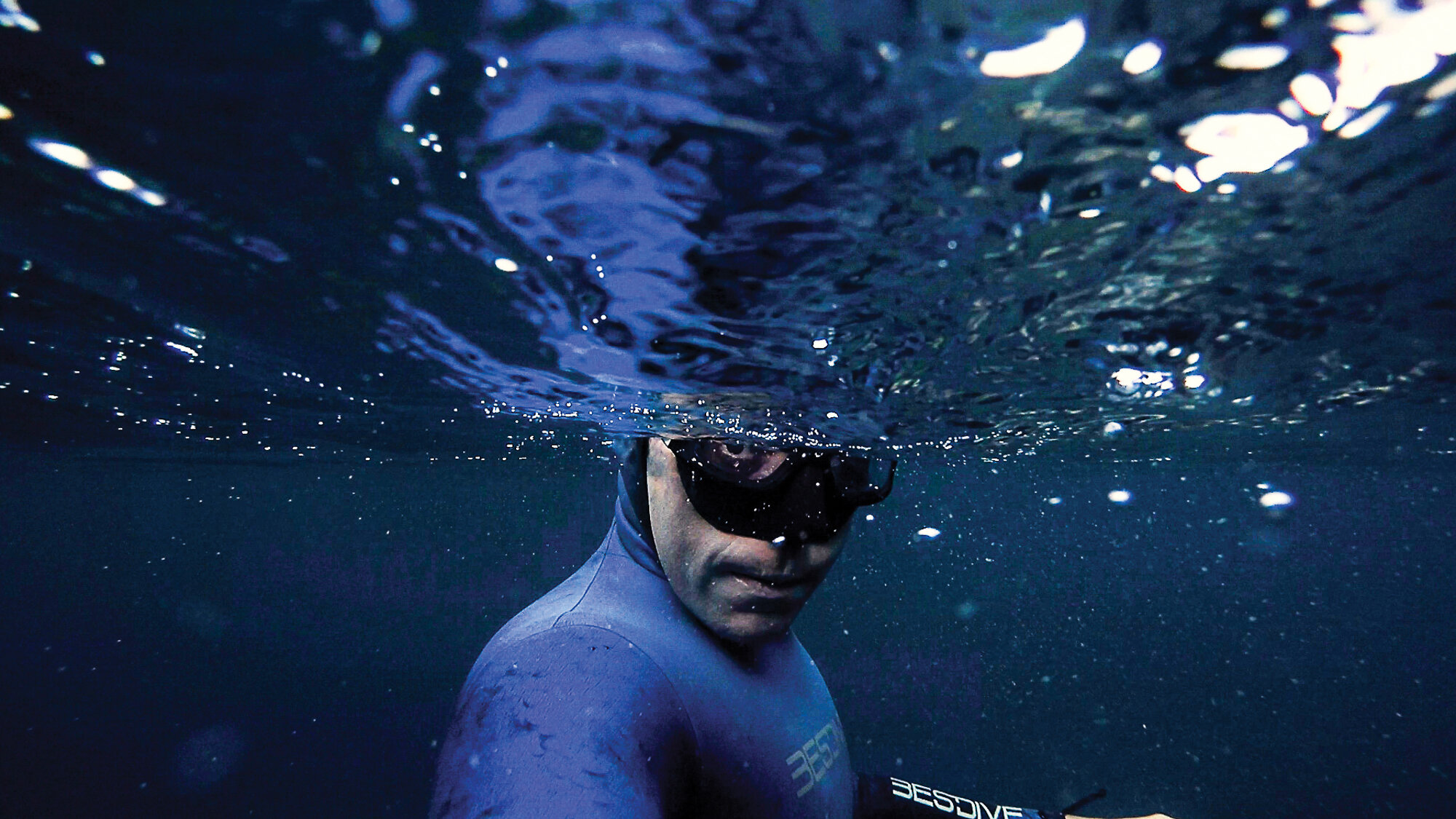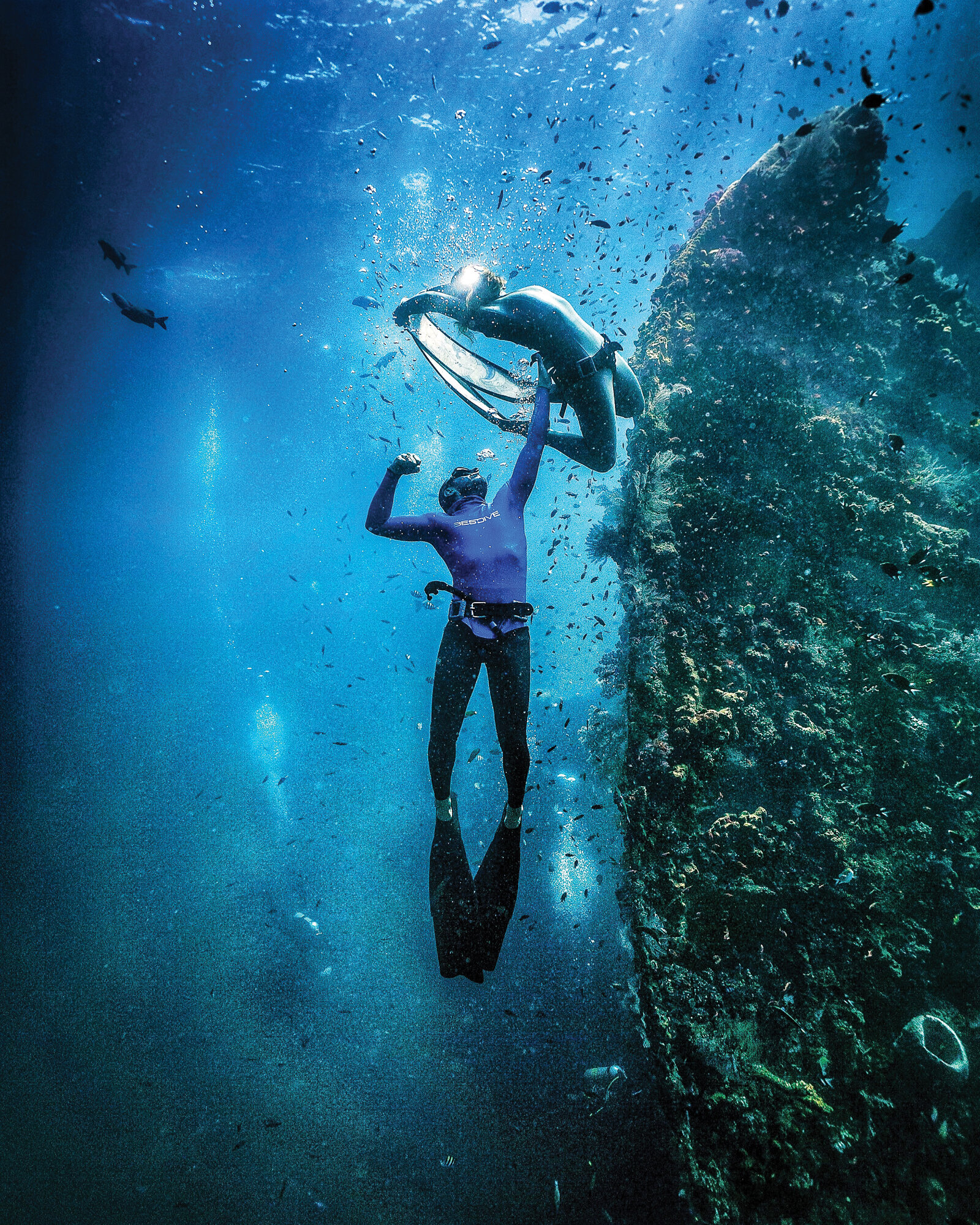Vertical Dreamers: The extraordinary life of freediving and breathing instructor Anthony Feoutis

Interview: Ruaidhri Marshall
Originally featured in Volume 1 of Dure Magazine
Anthony Feoutis is a French freediving master instructor and co-founder of the VD Freediving school based in Taiwan.
He is qualified as a F.E.M.R instructor, oxygen advantage instructor – and underwater vertical dreamer.
An exclusive article originally published in Dure Magazine Vol. 1. We present a deep dive into Anthony’s story. He discusses personal hardships and how he found a life of professional freediving in Taiwan.
Hello, my name is Anthony Feoutis, I am a professional freediver, co-owner of Vertical Dreamers freedive Taiwan. I am a freediving instructor in three of the best freediving systems: AIDA, Molchanov, and Apnea Total. I am also an Oxygen Advantage coach and an AIDA freediving medical emergency responder instructor. I am 40 years old, French. I travelled the world for 12 years. I lived in India for 5 years, where I got in contact with all the fantastic breathing techniques and knowledge of the yogi and Vedas. I started freediving in Bali, and it is my life, I cannot live without the ocean or without holding my breath and diving in it.
Tell me about teaching freediving in Taiwan. The coaching you participate in.
My wife and I opened the school 3 years ago. We were teaching mainly in Taipei (North of Taiwan) which included a lot of pool training and a few months in the ocean. The temperature of the water drops a lot there during Autumn and Winter, and it is not nice to bring beginners when it is freezing and dark. I said ‘we were teaching’ because we just opened another school in the southwest of Taiwan, on a beautiful little island named Xiaoluqiu. 25 to 29 degrees water all year round, sand beaches, and full of gorgeous sea turtles. It is a great place to practice freediving.
Freediving has many disciplines, and I love them all. I teach them all. The Molchanov freediving system is very, very complete, and we, the instructors, have the chance to initiate even the beginners to monofin technique and no fin technique. It is fun and super rewarding for our students and for us to see them progress. I also teach people how to breathe and get ready for their next competition. Not just freediving but all kind of sports.
What made you choose this path, or did this path find you?
Every Frenchman above 35 years old knows about freediving because of the movie The Big Blue. So, when a friend asked me if I wanted to watch a freediving competition, I said yes with a lot of enthusiasm. But honestly, I was not prepared to see a guy diving to almost one hundred meters. It was in Bali, Tulamben, for the Australian national championship of freediving. This day changed my life.
Le Grand Bleu (The Big Blue [ENG]), 1988
I was wandering around Asia for 8 years after 3 years in Paris. In France, I was making music for advertisements on TV, and the money I made then allowed me to just run away from a life I was hating. 5 years in India, 2 years living the hippie life with all the side effects you can imagine and 3 years on a Royal Enfield traveling everywhere. At this moment, my health was turning to shit. I weighed 53kg. Not good. My mum told me she believed I was dying. Then something inside me clicked. I stopped smoking, I discovered Pranayama and started working out.
‘‘Let us say this path found me, and I was ready to take it.’’
When I saw this guy doing this dive, I thought I was in shape and wanted to give it a try. If you can stop smoking you can do everything. At first, I wanted to do a discovery day, but the school misunderstood and registered me for a 3 day course. I just thought fuck it, let’s do it. From there, I have never stopped freediving. I stayed for 2 years in Bali and passed all the levels to the instructor certification. I am forever in debt to Julia Mouce Dominguez and Eli Dipp. They changed my life and taught me how to become a reliable, professional, and dedicated freediving instructor.
Let us say this path found me, and I was ready to take it.
Freefall?
As you go down, your lungs become smaller. At one point, they do not play their role of being balloons anymore. They are not big enough to make you float up. We say you become negatively buoyant, and you start falling. If you reach just 10 metres, you will fall very, very slow. But if you go deeper, pass 20 metres, and if you have the correct technique, then you will fall faster. It can be one meter per second. The sensation is incredible, it is difficult to describe. Relaxation is very important, your technique also. You enter a meditative state. You want to reach the depth you set before the dive, but you must focus on the now. The bottom of the line is the future and it is not so important. What does count is the now. You are falling into an ocean of infinite dark blue. It is you with yourself. It is the most special moment ever. Full of awareness. You are in control, or... maybe you are not. I always close my eyes during the freefall and I never look down. You can notice the change of colour through your eyelids, you feel the change of temperature. You need to scan your body to release the tensions and then...you reach the bottom of the line.
The journey back home starts. The physical effort to fight the negative buoyancy, the awakening of the body. The colours change again, the sunlight is calling you. Your safety makes a sound when she/he meets you. You are not alone anymore, your friend is there, you are safe. It is also something difficult to describe. This feeling of not being alone, of having somebody you trust with your life next to you, who focus on one thing and one only: being here if you are in need.
In the final metres, you let the ocean bring you back up as your lungs expand. The first breath is incredible. You open your eyes, see your friend and smile. We can think freediving is a lonely activity, after all, we spend most of our time alone underwater, but it is in fact reinforcing the connection we have with other humans.
Diving deep can sound crazy, and maybe it is, but we are trained, and freediving is not a dangerous sport if you respect the basic rules of safety. Therefore, it is crucial to take a course to learn how to dive safely.
Is freediving just about holding your breath?
No, it is not. Freediving is also about breathing the right way to get ready for the breath-hold. Not just before a dive but in everyday life too. We all need to learn how to breathe the right way and not just for freediving.
What is your favourite discipline?
In the pool, my favourite discipline is Static apnea (I hold my breath for more than 7 minutes). Basically, you hold your breath as long as you can, motionless at the surface of the pool.
Many people do not know that it is not the low-level oxygen that pushes you to breathe but the high level of carbon dioxide. When you hold your breath, the O2 goes down, and the CO2 goes up. One of the missions of the CO2 is to change the pH of the blood. As soon as the chemoreceptors in our brain detect a change of the acidity they are not used to, they trigger the breathing reflex to bring back the pH to normal. Static apnea is a fantastic way to train this CO2 tolerance and then to delay the urge to breathe. Very very useful when you dive deep. It makes everything way more comfortable.
In the ocean, my favourite discipline is free immersion. Under a buoy, a line is attached. This line is set to a specific depth. When we practice free immersion, we pull ourselves down and up using our arms. It is very relaxing. But the best part of freediving deep is what we call the freefall. So, no matter how you reach the freefall zone, by pulling or swimming down, the fun starts when you begin freefalling.
The dangers of freediving, do you have any bad experiences?
Freediving is a very safe sport if you respect the rules of safety. The body is an incredible machine and will do everything it can to protect you in case of a problem. The main danger in freediving is the shallow water blackout. It is a loss of consciousness due to a really low level of oxygen between -10m and the surface. If your brain detects there is not enough oxygen to keep the body functional, it will trigger a blackout. It is a kind of saving energy mode. A spasm will close the glottis, the water cannot go in your lungs. Basically, you fall asleep, and it is not possible for you to swallow water. From there, because you respect the first rule of freediving telling you to never freedive alone, your safety buddy brings you back to the surface, and you regain consciousness after a few seconds. Even if it sounds terrifying, it is not life-threatening. Like in all the other outdoor activities, there are risks. But I never think, for example, I could face a hungry bull shark when I am diving. The ocean is not our friend, we are its guests, and sometimes we can be very unlucky. Life happens.
‘‘I had one blackout, at the surface after a nofin dive I was not ready for.’’
I had one blackout, at the surface after a no-fin dive I was not ready for. I did not listen to my instructor, who was advising me to not do it. I have been stupid, and this never happened again. If I am tired, I change my plan and work on my technique at a shallower depth, and I stay safe. I learned to listen to my body and mind and to forget about the numbers on my dive computer. Freediving is about sensations, and you are the only one who can really know what is happening inside yourself.
What is your favourite dive site?
Raja Ampat is the most beautiful place I have ever been to. The underwater is incredible, full of life. The full food chain is there. From the smalls to the bigs. The corals are stunning. There are manta rays, sharks, octopus, and billions of small fish. We are organizing a freediving trip there every year, and every year it is like if it was my first time. Contact me if you want to join.
Raja Ampat
For training, it will always be Tulamben in Bali. I started there, my friends are there, there is a depth available of up to 120m. The fantastic liberty wreck to explore and…come on…it is Bali...the island of gods.
What motto do you live by?
Breathing is overrated! Peace.
The full article and more inspirational stories like it can be found on Dure Magazine Volume 1 - https://duremagazine.com/shop/volume-1
To find out more about Anthony Feoutis and his diving school in Taiwan follow the links below Instagram:
https://www.instagram.com/anthony.feoutis/
https://www.instagram.com/vdfreediving/
VD Freediving school: https://www.vdfreediving.com/en/



![Le Grand Bleu (The Big Blue [ENG]), 1988](https://images.squarespace-cdn.com/content/v1/5a8b0ee58fd4d2a41fb07074/1611248563212-Q7G0SKI5HQRPTSWO98I7/Big_Blue_poster_200px.jpg)




